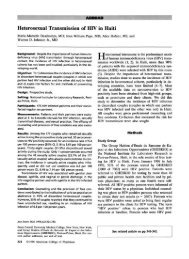Behavioural Surveillance Surveys - The Wisdom of Whores
Behavioural Surveillance Surveys - The Wisdom of Whores
Behavioural Surveillance Surveys - The Wisdom of Whores
You also want an ePaper? Increase the reach of your titles
YUMPU automatically turns print PDFs into web optimized ePapers that Google loves.
Informed consent<br />
Confidentiality and informed consent are<br />
important for all research subjects, but when<br />
the subject <strong>of</strong> the research is an illegal or<br />
stigmatized activity such as sex work, injecting<br />
drug use, or illegal migration into another<br />
country to work, the importance <strong>of</strong> protection<br />
<strong>of</strong> privacy is magnified.<br />
Behavioral surveys cannot take place<br />
without the informed consent <strong>of</strong> the respondent.<br />
Special efforts must be made to ensure that<br />
the potential respondents understand their<br />
rights and the risks involved, and that every<br />
effort is made to ensure that the community<br />
will benefit from the research. As discussed<br />
earlier, involving the community in planning<br />
and the dissemination <strong>of</strong> the research is one<br />
way to do this. In addition, the interviewers<br />
must be trained to inform people <strong>of</strong> the<br />
purposes <strong>of</strong> the survey and request participant<br />
consent in a factual and neutral manner. <strong>The</strong><br />
purpose <strong>of</strong> the survey should be explained<br />
to the respondent, including the risks and<br />
benefits, as well as the measures to ensure<br />
confidentiality. <strong>The</strong> respondent should give<br />
verbal consent to the interview, and the<br />
interviewer should sign his/her name indicating<br />
that verbal informed consent has been given.<br />
Some respondents may refuse to participate<br />
and in this situation interviewers should<br />
respect the respondent’s rights, and thank<br />
them for their time. To ensure confidentiality,<br />
no identifiers should be recorded on the<br />
respondent questionnaire.<br />
Questionnaire administration<br />
and interview settings<br />
In situations where some members <strong>of</strong> the<br />
sub-population <strong>of</strong> interest may be illiterate,<br />
BSS data should be collected by a trained<br />
interviewer who explains questions to the<br />
respondent and records answers. Where all<br />
respondents are literate and educated such as<br />
with student populations, respondents may<br />
record answers to questions themselves on an<br />
anonymous written questionnaire, submitting<br />
it to a data collection manager in a sealed<br />
envelope so that it cannot be distinguished<br />
from that <strong>of</strong> other respondents. Since the<br />
respondent is not confronted with a face-to-face<br />
interviewer who they fear may disapprove<br />
<strong>of</strong> the behaviors they report, they may be<br />
more honest with their answers to sensitive<br />
questions. This may increase the validity <strong>of</strong><br />
self-reported behaviors.<br />
With trained interviewers, it is nevertheless<br />
important to conduct survey interviews in<br />
settings where questions and answers cannot<br />
be overheard by others and to engage in a<br />
rapport-building conversation prior to asking<br />
survey questions. This will reduce the<br />
likelihood that respondents will give “socially<br />
desirable” answers rather than telling the truth.<br />
If a third person enters the room or is within<br />
hearing distance, the interviewer should<br />
explain that it is important to interview the<br />
respondent alone.<br />
B EHAV I OR A L S U R V EI L L A NC E SURV EY S CHAPTER 6<br />
71










